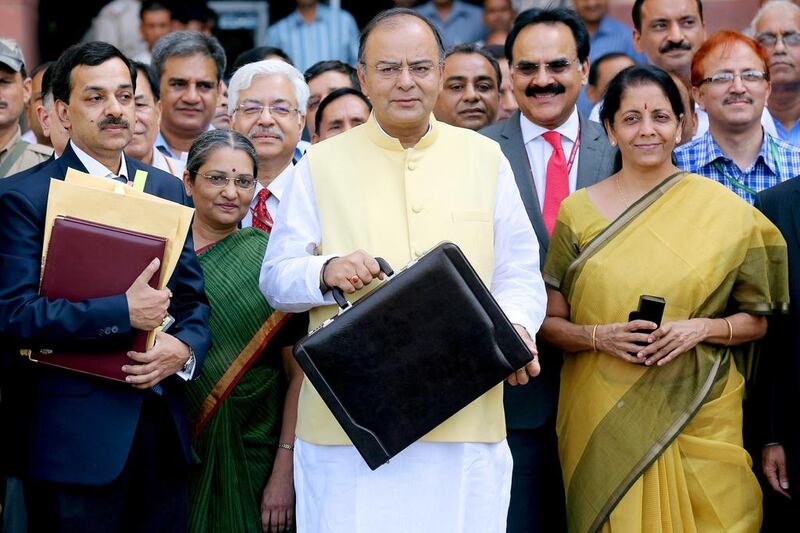Mumbai // India’s first budget under Narendra Modi’s new government met mixed reactions from the country’s business community, as it displayed a “prudent” approach but failed to deliver on hard-hitting major announcements.
Expectations for the budget were extremely high, with demands on the government to tackle inflation, boost economic growth and create more jobs.
Some of the highlights of the budget, delivered by finance minister Arun Jaitley yesterday, included raising the limits for the defence and insurance sectors to 49 per cent from 26 per cent and a plan to approve a long-awaited goods and service tax by the end of this year.
“Overall a good budget and in line with the fiscal prudence needed at this point in time,” said Anutosh Bose, the chief operating officer of LIC Nomura Mutual Fund.
“The finance minister has indicated that the present government is taking a long-term view for bringing back the economy on track on a sustainable basis. If the government is able to deliver on these proposals, then it will definitely help in achieving the fiscal deficit targets and also rejuvenate the Indian economy.”
Markets reacted positively to the budget speech initially, but by the end of the day these gains had been erased and the benchmark BSE Sensex closed down 72 points at 25,372.75. The Indian rupee weakened from an opening price of 59.70 rupees to 59.99 rupees against the US dollar.
Mr Jaitley, in his presentation of the budget, said the country was “in no mood to suffer unemployment” and that his aim was to outline the steps towards achieving economic growth of 7 to 8 per cent or above in the next three to four years.
Mr Jaitley announced a skill development programme for India’s youth, to train them in vocations such as carpentry and masonry.
“With over 25 million Indians residing overseas and the ever-increasing demand for a semi-skilled workforce, especially in GCC countries, ‘Skill India’ will help to train migrant workers and equip them with the necessary skills required for their jobs overseas, thus providing an edge to the Indian workforce globally,” said Sudhesh Giriyan, the vice president and business head of Xpress Money, a remittances firm.
The Bharatiya Janata Party (BJP) came to power in May following a landslide victory. Its election campaign was heavily focused on plans to boost the economy after the country’s GDP slowed to decade-low levels below 5 per cent under the previous government.
“Prudence is what comes to mind when describing the union budget,” said Raghu Kumar, the co-founder of RKSV, a Mumbai-based brokerage.
Amit Rathi, the managing director of Anand Rathi Financial Services, said the budget was “a good effort in a short period of time” and that it demonstrated a business-friendly approach.
“While the union budget is low on big-bang announcements, it is highly focused on smoothening out the operational irritants that impedes business decision-making,” said Mr Rathi.
“The significant move in this budget was to create a funding source for infrastructure projects by exempting banks from reserve requirements on such lending. This could be a game changer.”
Mr Rathi praised the government’s measures to encourage small and medium-sized businesses, which he described as “refreshing as it recognises that these smaller entrepreneurs are really the building blocks of our economy”.
Others expressed disappointment, however.
“The expectation that there would be a special thrust to the agriculture and food sectors in the budget has been belied,” said Sanjay Kaul, the managing director and chief executive of NCML, a warehousing and supply chain management company in India.
There are concerns that poor monsoon rains this year could negatively affect production and therefore push up already high inflation levels.
“There has also been no policy shift to signal greater engagement of the private sector and attract investment in this vital sector,” said Mr Kaul. “It is also surprising that the finance minister did not announce any short-term measures to tackle food inflation.”
Meanwhile, the budget was seen as largely positive for the property sector in India, analysts said, with funds allocated for low-cost housing schemes, infrastructure including ports and highways, and the creation of 100 smart cities.
“We are satisfied that the real estate sector is once again headed in the right direction,” said Anuj Puri, the chairman and country head of JLL India.
Ankur Bisen, a senior vice president for retail at Technopak, an Indian consultancy, pointed out that there were significant steps towards boosting domestic manufacturing in the budget, while it also raised “futuristic but important” issues.
These included plans to roll out the introduction of e-visa facilities at nine airports in India over the next six months to boost tourism into India.
business@thenational.ae
Follow us on Twitter @Ind_Insights





